
In recent years, technology has changed how healthcare works. Managing healthcare with tasks like patient care and administrative work can be complicated, leading to problems like inefficiency and lower-quality care. So, healthcare apps have become important to meet the growing need for medical help.
Healthcare web apps offer a host of benefits. They are accessible and efficient. Healthcare web application development can enhance your healthcare services. It simplifies the process of providing quality care while also managing administrative tasks.
The blog will guide you through the transformative journey of creating a healthcare app that could revolutionize how people care for their health. We’ll delve into the different types of healthcare apps and explore how businesses can leverage the expertise of a healthcare app development company. And provide insights into the cost and timeframes of developing a healthcare web app.
What’s a Healthcare Web App?
A healthcare web app is software you use through a web browser to do various healthcare-related things online. It can help you book doctor appointments and access medical records. Learn about health conditions and even talk to healthcare providers. These features are meant to make healthcare easier and get patients more involved. And ensure that data is safe and follows healthcare rules.
Why create a healthcare web app?
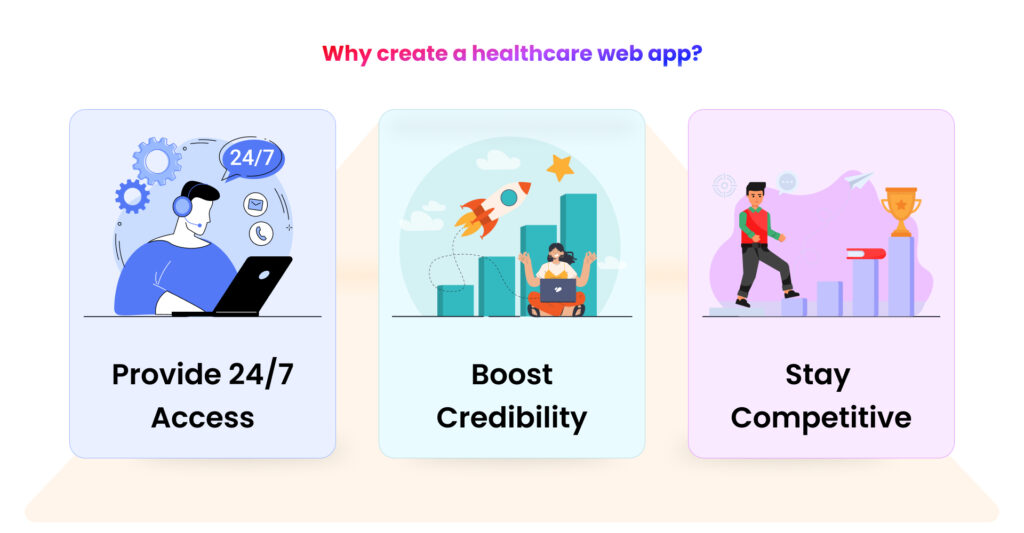
Here are some compelling reasons:
Provide 24/7 Access
Health concerns sometimes arise during regular office hours. By offering a web app, you can provide round-the-clock support to your patients, whether it’s booking appointments, accessing information, or seeking advice. Patients can do it anytime, anywhere, without the need to visit the hospital.
Boost Credibility
Patients turn to the internet for healthcare information, with almost half of internet users searching for doctors online. Moreover, a strong online presence influences the choice of healthcare provider for about two-thirds of patients. A healthcare website is crucial for establishing credibility in today’s digital age.
Stay Competitive
In the healthcare industry, staying ahead means meeting patients’ needs better and more than competitors. A well-developed healthcare website is key to achieving this. With most patients making decisions based on online presence, having a competitive web app is essential. Plus, healthcare is a growing industry with significant investment opportunities, making it both competitive and promising for those who innovate.
Step-by-Step Guide to Healthcare App Development Services
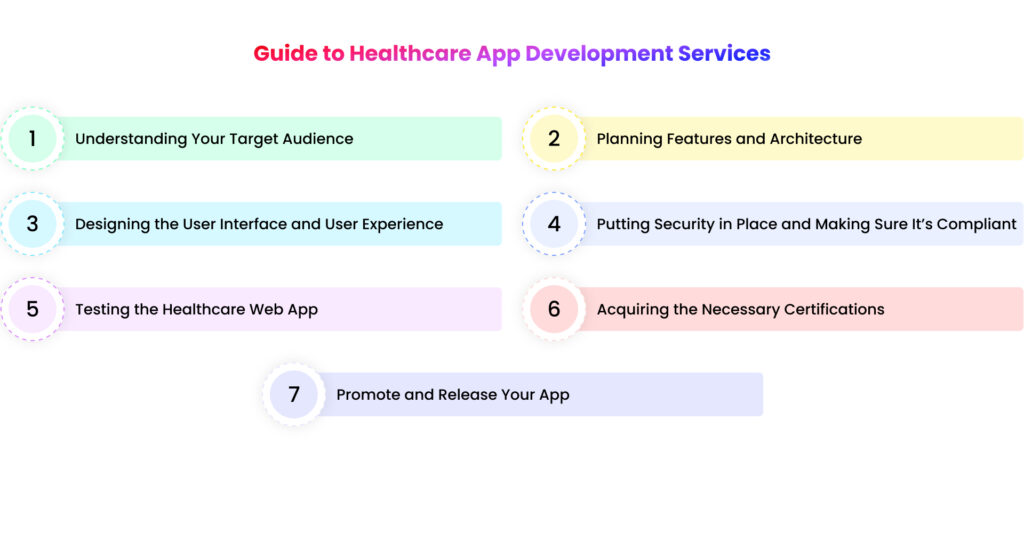
Step 1: Understanding Your Target Audience
Before embarking on the coding and designing process. It’s crucial to understand why you are creating a healthcare app and who it is intended to assist. This user-centric approach is backed by in-depth market research. Ensures that your app addresses your audience’s precise healthcare issues. You can better change your app by understanding its problems and intended results. To suit their requirements, making them feel valued and considered.
Requirements collecting also includes evaluating technical, functional, and regulatory factors to provide a strong basis for development. It would help if you worked with regulatory experts, healthcare professionals, and potential users to determine the features. And functions that best serve your audience and ensure industry standards and laws compliance.
Step 2: Planning Features and Architecture
Creating a solid architecture to support the operation of your healthcare app is as important as defining its features in a detailed plan. Start by outlining the essential features and functions that will suit the demands of your intended audience. And handle the recognized healthcare concerns. When designing the software’s architecture, consider data storage, scalability, interoperability, and security.
Establish the structure of the application and the methods for storing and accessing data. And the methods by which users will communicate with the system. Furthermore, consider the user experience (UX). And make sure that the app’s design facilitates easy navigation and fluid interaction. By designing its features and architecture, you may guarantee your healthcare app’s scalability, adaptability, and efficacy in meeting user demands.
Step 3: Healthcare App User Interface (UI) and User Experience (UX)
Once you’ve established your healthcare app’s functionality and architecture. You should design its user interface (UI) and user experience (UX). Your app’s UI/UX design influences how people engage with it, impacting its usefulness and efficiency. Start by drawing the app’s design, organization, and navigation wireframes. These wireframes outline the app’s visual style and functionality.
The design team may start developing the app’s visual components, such as its colors, fonts, and photos. And interactive features as soon as the wireframes are complete. Ensuring the user interface (UI) design is consistent with your business identity and produces a seamless, interesting user experience is important. By prioritizing user-centric design concepts and considering usability testing input. You may develop a UI/UX that appeals to your target audience’s requirements and preferences.
Step 4: Putting Security in Place and Making Sure It’s Compliant
Since healthcare apps handle sensitive patient data, security is crucial. Strong security methods must be implemented throughout the app’s development process to safeguard sensitive data against breaches and illegal access. To protect patient information, this entails implementing access restrictions, encryption, and secure authentication procedures.
Since healthcare apps often handle sensitive patient data, ensuring security is paramount. Adequate safety precautions while creating an app may prevent data breaches and unauthorized access. Compliance with laws, including the Health Insurance Portability and Accountability Act (HIPAA), is also essential. Incorporating HIPAA-compliant measures into the app’s design, data handling, and security protocols is necessary. By prioritizing security and compliance. You can build consumer trust and cut the risk of data breaches and legal issues.
Step 5: Testing the Healthcare Web App
Extensive testing is necessary to ensure your healthcare web app meets the highest quality, dependability, and usability standards. Various software elements, such as functionality, performance, and security. And platform and device compatibility should be tested. Before making the app available to consumers, test it to find and fix bugs, flaws, or usability problems.
It is advisable to involve the intended user base in usability testing to get insightful input on the app’s user experience and pinpoint opportunities for enhancement. Furthermore, frequent testing and quality control during the development phase may guarantee that the application fulfills user requirements and provides a smooth and easy-to-use interface.
Step 6: Acquiring the Necessary Certifications
Obtaining the required certifications and approvals is essential for healthcare apps handling medical data or services to prove compliance with industry norms and laws. Based on the type of software and the area it will be used. This might involve certifications like HIPAA compliance, FDA clearance, or certifications from other regulatory authorities. Consult regulatory specialists. And healthcare authorities to learn the precise requirements and procedures for acquiring the required certificates. You may establish your app’s legitimacy and legality and gain the trust of users and stakeholders by gaining the necessary certifications. And approvals.
Step 7: Promote and Release Your App
Once your healthcare web app has undergone extensive testing and certification. It’s time to prepare for its launch and promotion. Plan a thorough marketing plan to raise awareness and draw people to your application. Ideas like email marketing, social media marketing, and search engine optimization (SEO). And collaborations with healthcare organizations or providers fall into this category.
To create enthusiasm about your app:
- Think about holding a launch party or creating buzz through media coverage or press releases.
- Make sure your software is available online and on dependable servers.
- Make last-minute inspections to ensure everything works as it should before releasing your app to the public. Increase the effect and reach of your healthcare web app and draw in a devoted user base by investing in a significant marketing strategy. And ensuring the launch goes well.
Cost to Develop a Healthcare Web Application?
The cost of developing a healthcare web app ranges from $20,000 to $150,000 or more. Cost factors include complexity, features, design, and development team rates. Careful planning and collaboration with a skilled mobile app development team like The Intellify are essential to ensure a successful and cost-effective project.
For a simple app with basic functionalities like appointment scheduling, user profile management. And secure authentication, the cost falls from $20,000 to $50,000. Moving up to a more complex app that integrates telemedicine, electronic health records, health tracking tools, messaging features. And personalized user dashboards, the cost range extends from $50,000 to $70,000. For complex apps incorporating advanced predictive analytics, AI-powered diagnosis, integration with IoT devices for remote patient monitoring, and comprehensive data analytics, the cost can exceed $70,000. It may reach up to $150,000 or more.
It’s essential to note that these are approximate cost ranges. And actual expenses can vary based on specific project requirements, developer expertise, geographical location, and other factors.
How Much Take Time to Develop a Healthcare Web App?
The time it takes to build a healthcare web application can range from 4 to 18+ months, depending on its complexity. For simpler apps, like basic patient portals or appointment booking systems, it might take around 1 to 3 months to develop. Medium-level apps, such as telehealth or prescription management systems, take 4 to 8 months. Meanwhile, complex apps like comprehensive hospital management systems or advanced diagnostic tools might take 9 to 18 months or even longer to build. Factors like team size, project scope, and technical challenges can influence the timeline. Collaborating with web developers is crucial to getting an accurate timeline for your healthcare website.
Additionally, it’s important to consider factors like testing and feedback incorporation. And regulatory compliance during the development process, which can further extend the timeline. Regular communication with the development team and clear project milestones help ensure the development stays on track. And satisfies the desired goals within the expected timeframe. If you want constant help for your healthcare app development, go beyond The Intellify.
Different Types of Healthcare Web Apps
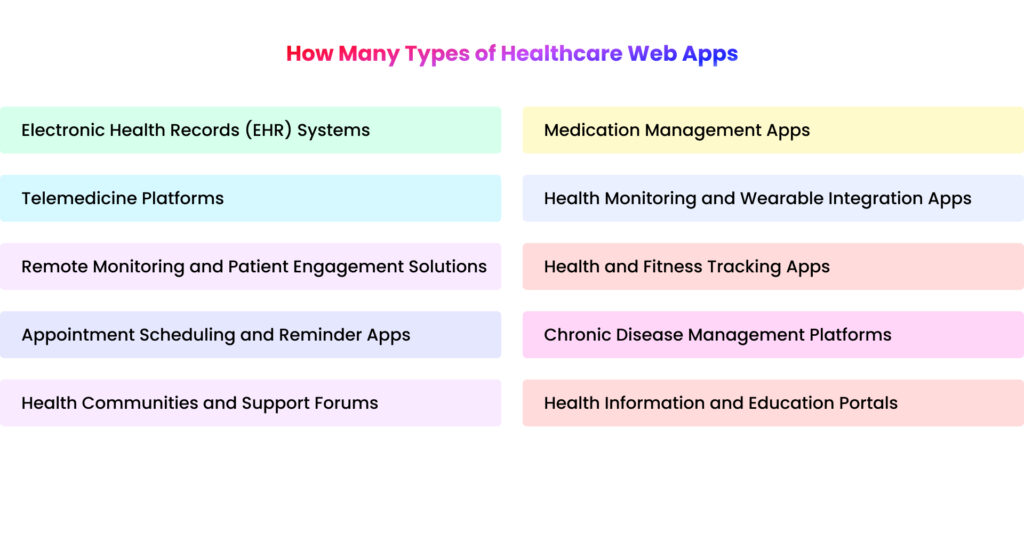
About healthcare web apps, various types cater to different needs. Each type of healthcare web app serves a unique purpose, contributing to improved healthcare delivery, patient empowerment, and well-being. These are:
Electronic Health Records (EHR) Systems
These systems store and maintain patients’ medical records, making it simpler for doctors to access and update them. They streamline clinical workflows, enhancing efficiency in healthcare delivery.
Medication Management Apps
These apps assist users in tracking medications, dosages, and schedules. They can provide alerts for medication interactions and reminders for timely pill intake, helping users stay on top of their treatment plans.
Telemedicine Platforms
These allow remote medical consultations through video, chat, or phone calls, connecting patients with healthcare professionals. They’re particularly valuable for those who can’t access traditional healthcare settings.
Health Monitoring and Wearable Integration Apps
These apps connect with wearable devices to check users’ vital signs and activity levels. They provide insights into users’ health and encourage healthy living through data-driven feedback.
Remote Monitoring and Patient Engagement Solutions
These solutions enable doctors to check patients’ health conditions and provide timely interventions. They enhance patient engagement in their healthcare journey, promoting better health outcomes and continuity of care.
Health and Fitness Tracking Apps
These apps help users check their exercise routines, nutrition, sleep patterns, and health. They often include activity tracking, meal planning, and setting health goals to encourage healthier lifestyles.
Appointment Scheduling and Reminder Apps
These apps simplify booking and managing appointments with healthcare facilities. They often allow online scheduling, rescheduling, and sending appointment reminders to ensure patients don’t miss important appointments.
Chronic Disease Management Platforms
Designed for individuals with chronic conditions, these platforms enable remote monitoring and management of health over time. They help prevent complications and enhance the quality of life for those living with chronic illnesses.
Health Communities and Support Forums
These online platforms bring together individuals with similar health conditions, allowing them to connect, share experiences, and provide emotional support to one another. They foster community and solidarity among those facing similar health challenges.
Health Information and Education Portals
These portals offer reliable medical information, health tips, and educational resources on various conditions and treatments. They play an important role in promoting health literacy. And empowering people to make informed decisions about their health.
Final Thoughts
The evolving landscape of healthcare is intertwined with technological advancements and the proliferation of healthcare web apps. These apps offer various benefits, from improved accessibility. And patient engagement to streamlined clinical workflows and enhanced credibility for healthcare providers.
By leveraging the step-by-step guide outlined in this blog, businesses can develop healthcare web apps tailored to meet the diverse demands of patients and healthcare professionals alike. Healthcare web applications may improve health outcomes. And well-being in the digital age with careful planning, cooperation with professional development teams like The Intellify, and regulatory compliance.


Written By, Jalaj Shah
The COO and Co-Founder of The Intellify. Jalaj enjoys experimenting with new strategies. His posts are fantastic for businesses seeking innovative development ideas. Discover practical insights from his engaging content.
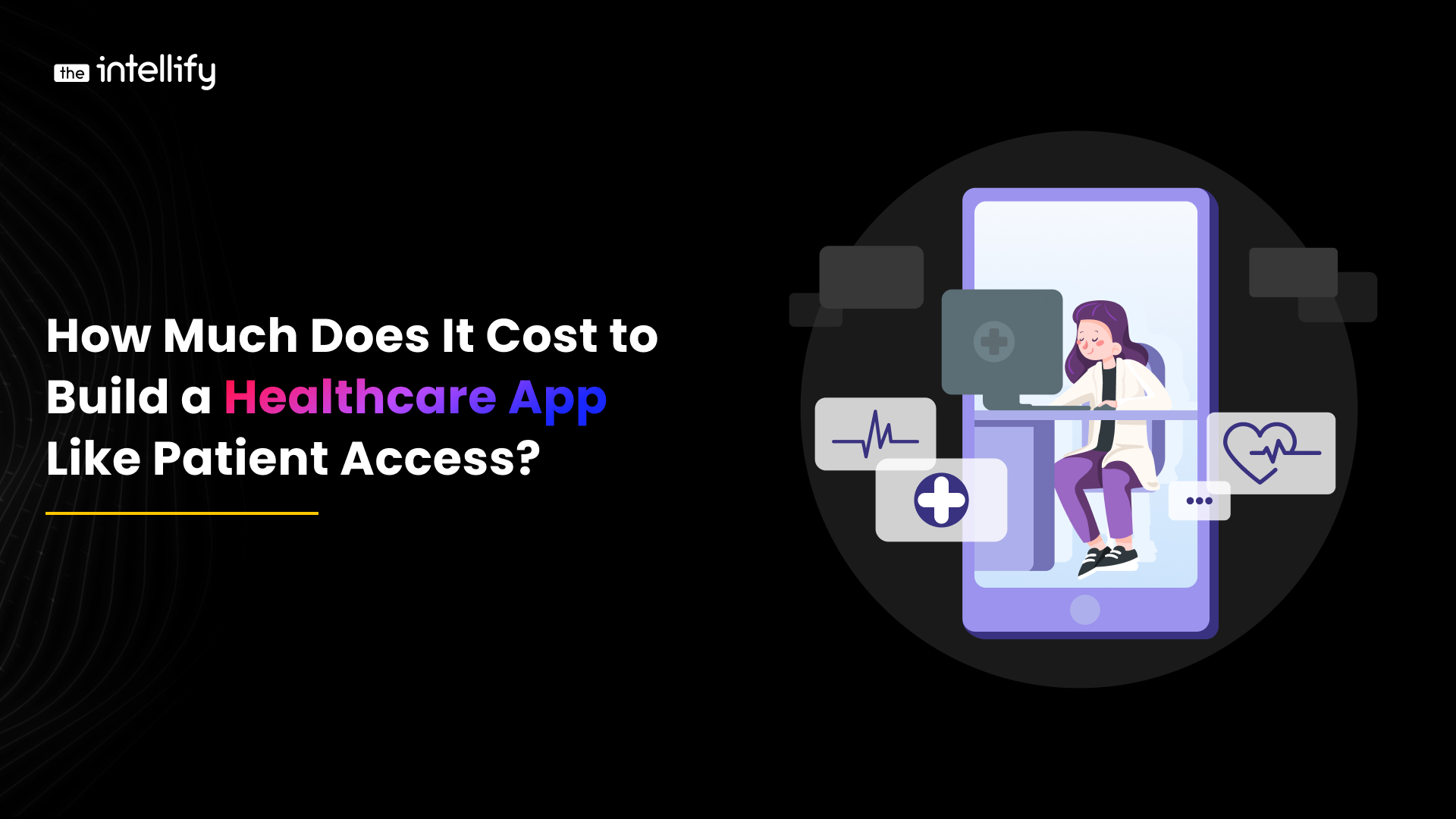

How Much Does It Cost to Build a Healthcare App Like Patient Access?
Costs of Developing Healthcare Apps In the quickly changing landscape of digital healthcare, patient-centric apps like Patient Access have emerged as critical tools for improving patient care and expediting medical procedures. These apps let users arrange appointments, access their medical information, manage medications, and contact healthcare providers from the comfort of their own homes. The […]
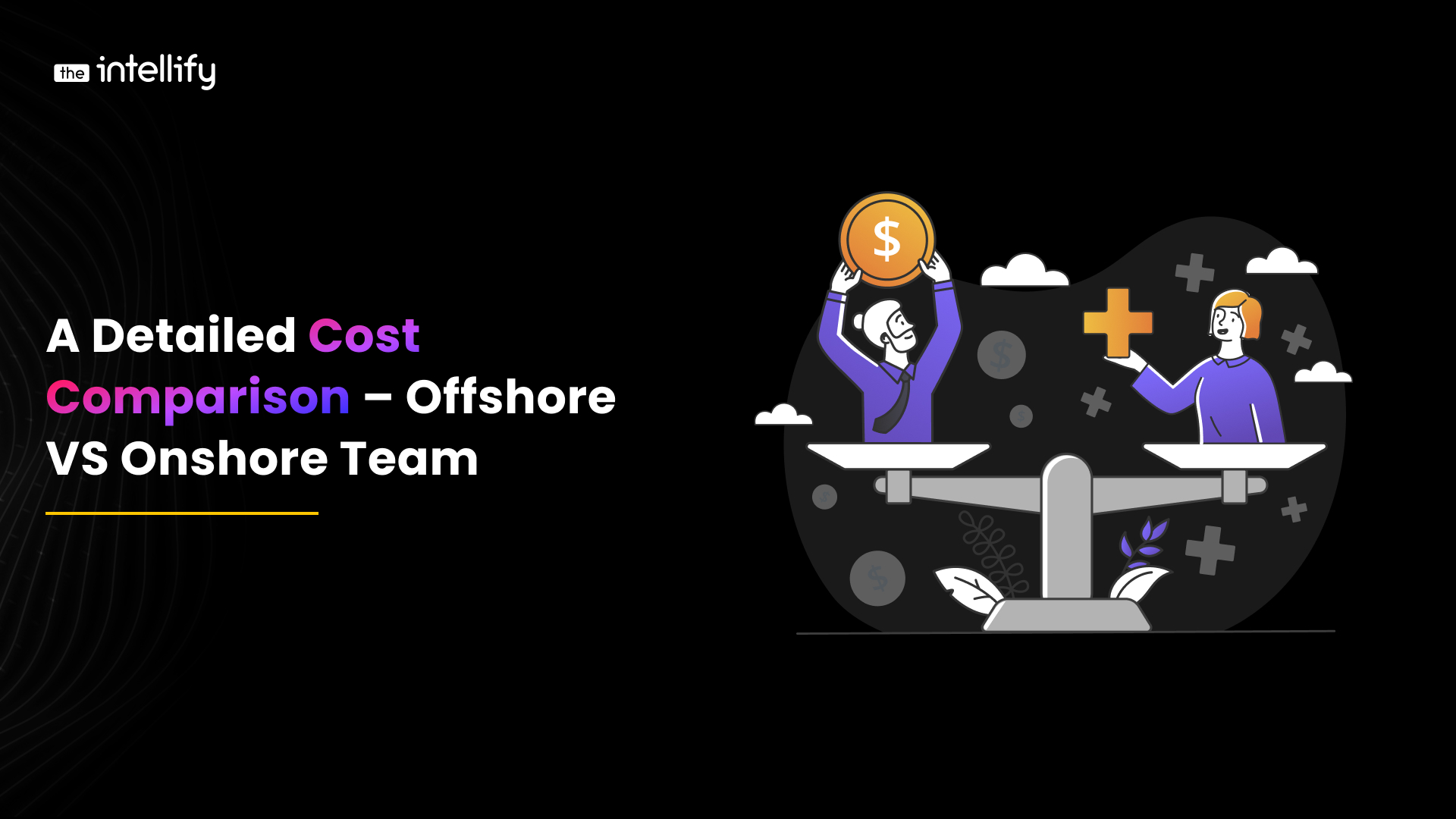

A Detailed Cost Comparison Offshore VS Onshore Teams
Detailed Cost Comparison Offshore VS Onshore Teams The world is always changing due to globalization. The choice between offshore vs onshore outsourcing teams is crucial for companies. Thanks to globalization, which erases boundaries. Organizations can depend on a vast talent pool worldwide. This has led to offshore outsourcing. In it, a team from another country, […]


Top 10 Healthcare Business Ideas to Boost Your Startup Success
Innovative Opportunities for Startups in Healthcare Startups find the healthcare sector promising. This is because demand for better and more accessible healthcare is growing. New technologies, like telemedicine and wearable health devices, create innovation opportunities. They also create chances for improvement in patient care. Blockchain technology can also enhance data security and streamline healthcare processes. […]


How Much Does It Cost to Build a Healthcare App Like Patient Access?
Costs of Developing Healthcare Apps In the quickly changing landscape of digital healthcare, patient-centric apps like Patient Access have emerged as critical tools for improving patient care and expediting medical procedures. These apps let users arrange appointments, access their medical information, manage medications, and contact healthcare providers from the comfort of their own homes. The […]


A Detailed Cost Comparison Offshore VS Onshore Teams
Detailed Cost Comparison Offshore VS Onshore Teams The world is always changing due to globalization. The choice between offshore vs onshore outsourcing teams is crucial for companies. Thanks to globalization, which erases boundaries. Organizations can depend on a vast talent pool worldwide. This has led to offshore outsourcing. In it, a team from another country, […]


Real Estate Mobile App Development 101: All You Need to Know
Today, the real estate industry is improving with the help of new technology. Mobile applications are one of the major aspects of this shift. Real estate mobile app development has become crucial for such businesses, which must remain relevant. The applications benefit buyers, sellers, agents, and property managers. In the contemporary world, individuals desire convenience […]

0
+0
+0
+0
+
Committed Delivery Leads To Client Satisfaction
Client Testimonials that keep our expert's spirits highly motivated to deliver extraordinary solutions.

Let’s start a Conversation about your Business Goals!
Drop us a line to Start a Project with us
Contacts For Business
Contacts For Career












